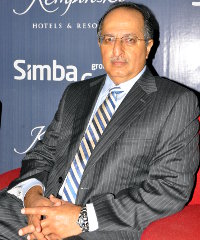Kenyan CEO attributes business success to lessons learnt from father
There are numerous examples of Asian-owned businesses in East Africa that started as small entities decades ago and have grown to become multi-million dollar regional enterprises. Younger generations have picked up from their parents and helped to expand the family businesses. One reason behind this successful transition is the fact that from a young age children watched and learnt business acumen from their parents.
This was the case for Adil Popat, the CEO of Simba Corporation, a diversified Kenyan company with interests in hospitality, real estate and vehicle distribution, representing brands such as BMW, Mitsubishi and Mahindra. Simba, which means lion in Swahili, was established in 1948 by Popat’s father as a small family-owned auto dealership selling used-cars.
When his grandfather died Popat, just 16, and his cousins who were on school holidays stepped in to help run the family shop which sold construction materials. And after completing his studies and working in the hospitality industry abroad he moved back to Kenya to join his father’s vehicle business as finance director. He took over as CEO seven years ago, and under his leadership Simba has diversified its interests beyond selling and servicing cars.
Popat tells How we made it in Africa that he acquired vital business lessons from his father whom he describes as “a great icon in business in Kenya”.
“My father [Abdul Karim Popat] was a great teacher. He was a university on two legs,” says Popat. “He taught me that honesty and integrity is fundamental. He always emphasised the importance of us being meticulous about how we transact our business.”
Customers are never numbers
Popat explains that his father appreciated the need for proper financial control and great relations with customers.
“He taught me that when you sell something make sure you get the money for it. It is not important just to sell. It is important to know your customer and have a relationship with that customer. This is what a lot of people forget and customers just become a number. Our customers are never numbers. We want to know them personally, we try to engage with them, and we try to be part of them.”
The CEO narrates how years back he invested in South Africa and made losses. His father urged him not to “cry over it”, but instead to cut his losses and learn from the experience.
“I was lucky that I had a father who was very understanding. I never regret that experience because I got much education out of it. I now know how to deal with situations in certain circumstances because of that experience. The thing about mistakes is that it spurs you to do better. I keep telling my children: when you make a mistake get up and go do it again, but be sure to do it better.”
Empower your managers
In the last seven years Popat has steered the expansion of Simba into new sectors. He says that in each new business he makes certain he understands how things operate and not only rely on the knowledge of managers. “Yes we will hire people to run it, but I too must thoroughly know the business. It is very important that as CEO you know your numbers well, and get good people to run it while you oversee all aspects.”
Popat’s management style entails hands-on involvement on projects at the onset and delegation to managers in the later stages.
“When my new executive director came on board within a couple of months I delegated duties to him… now when I travel I don’t call the office because he manages it. We are also empowering all our senior managers. In the past they did not travel to meet our principals but today instead of just one person travelling we send a delegation of even seven people. Engaging with our principals gives them a better understanding of the business.”
Decision making ‘by committee’
The Simba boss says he prefers discussing and making decisions with his team as opposed to making unilateral decisions that can be perceived as dictatorial.
“Decision making is always by committee. We sit, we talk about issues and we make decisions. I think getting people on the same page is extremely important. You can make the decision but you can’t enforce the decision. I want a decision that is enforceable and one that people will accept because that is the decision we have all agreed upon. If you don’t do that, you become dictatorial.”
Although his once poor family is now wealthy, Popat says he chooses to remain humble and interacts with all people. “I think people feel that when you have money and status you become something else. Naturally you associate with different people, but I think I am able to integrate and mix with anybody.
“I have learnt that balance is very important in life. That ability to meet and be with people from different backgrounds is essential. Arrogance has got no place in this world. You could be rich today, and be a very poor man tomorrow.”


